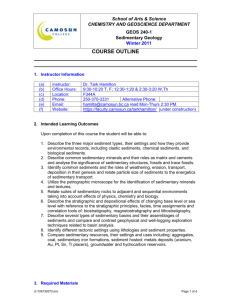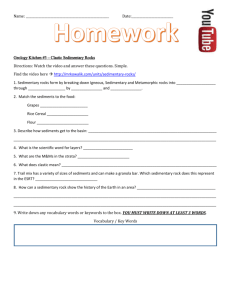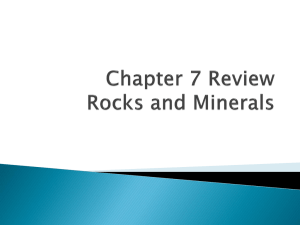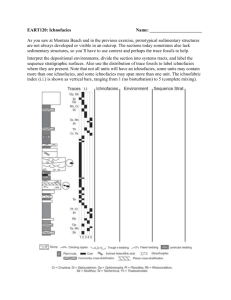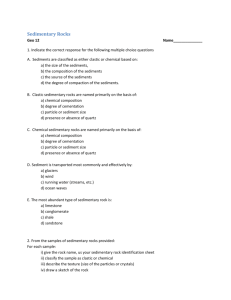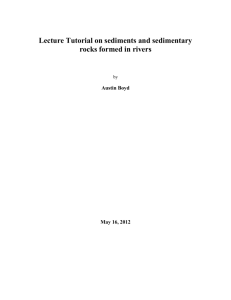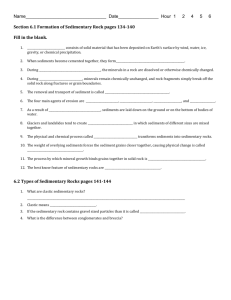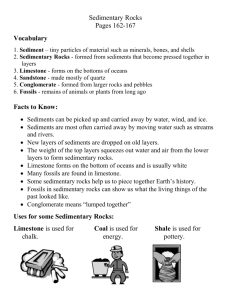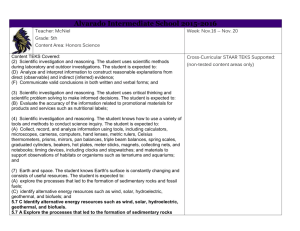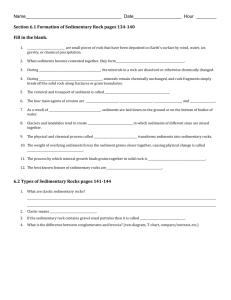Ethan Frome
advertisement
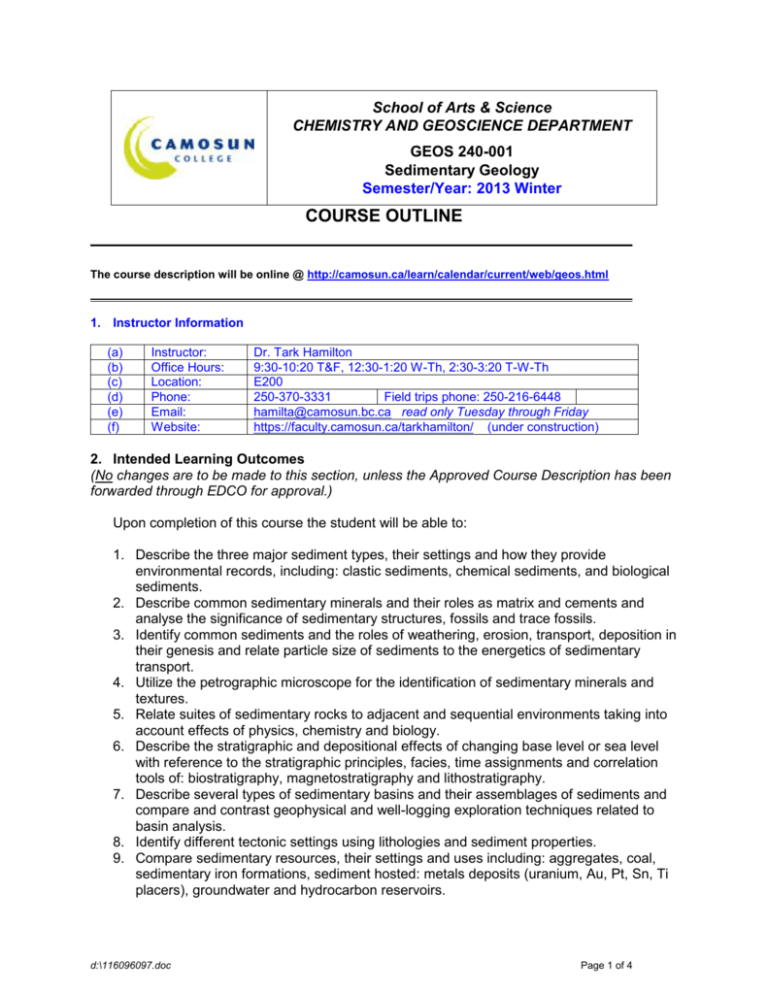
School of Arts & Science CHEMISTRY AND GEOSCIENCE DEPARTMENT GEOS 240-001 Sedimentary Geology Semester/Year: 2013 Winter COURSE OUTLINE The course description will be online @ http://camosun.ca/learn/calendar/current/web/geos.html 1. Instructor Information (a) (b) (c) (d) (e) (f) Instructor: Office Hours: Location: Phone: Email: Website: Dr. Tark Hamilton 9:30-10:20 T&F, 12:30-1:20 W-Th, 2:30-3:20 T-W-Th E200 250-370-3331 Field trips phone: 250-216-6448 hamilta@camosun.bc.ca read only Tuesday through Friday https://faculty.camosun.ca/tarkhamilton/ (under construction) 2. Intended Learning Outcomes (No changes are to be made to this section, unless the Approved Course Description has been forwarded through EDCO for approval.) Upon completion of this course the student will be able to: 1. Describe the three major sediment types, their settings and how they provide environmental records, including: clastic sediments, chemical sediments, and biological sediments. 2. Describe common sedimentary minerals and their roles as matrix and cements and analyse the significance of sedimentary structures, fossils and trace fossils. 3. Identify common sediments and the roles of weathering, erosion, transport, deposition in their genesis and relate particle size of sediments to the energetics of sedimentary transport. 4. Utilize the petrographic microscope for the identification of sedimentary minerals and textures. 5. Relate suites of sedimentary rocks to adjacent and sequential environments taking into account effects of physics, chemistry and biology. 6. Describe the stratigraphic and depositional effects of changing base level or sea level with reference to the stratigraphic principles, facies, time assignments and correlation tools of: biostratigraphy, magnetostratigraphy and lithostratigraphy. 7. Describe several types of sedimentary basins and their assemblages of sediments and compare and contrast geophysical and well-logging exploration techniques related to basin analysis. 8. Identify different tectonic settings using lithologies and sediment properties. 9. Compare sedimentary resources, their settings and uses including: aggregates, coal, sedimentary iron formations, sediment hosted: metals deposits (uranium, Au, Pt, Sn, Ti placers), groundwater and hydrocarbon reservoirs. d:\116096097.doc Page 1 of 4 3. Required Materials (a) (b) Texts Other “Sediments and Basins” Andrew Miall 2006 required Canadian Edition Earth: An Introduction to Physical Geology, E.J. Tarbuck, F.K. Lutgens, C.J. Tsujita & S. R. Hickock 3rd ed. Prentice Hall 2012. (Note: this has sections on rivers, beaches, glaciers etc.) “Ancient Environments and the Interpretation of Geologic History” 3rd ed. Lynn Fichter and David Poche. Out of print. Lab copies available for loan only. Do not mark in books or deface pages. “AGI Laboratory Manual in Physical Geology” 9th edition by Busch and Tasa (From Geos 100) for mineral and rock identification and selected exercises. Labs 2, 4, 5, 6, 7, 8 have handy reference and background materials. Labs 11, 12, 13, 14, 15 provide in depth examples on specific sedimentary facies. Llimited in-lab-use-only loaner copies available of older editions. 4. LEARNING SUPPORT AND SERVICES FOR STUDENTS There are a variety of services available for students to assist them throughout their learning. This information is available in the College calendar, at Student Services, or the College web site at camosun.ca. STUDENT CONDUCT POLICY There is a Student Conduct Policy which includes plagiarism. It is the student’s responsibility to become familiar with the content of this policy. The policy is available in each School Administration Office, at Student Services, and the College web site in the Policy Section. No eating or drinking allowed in laboratories or while in F300 as this room is also used as a chemistry lab. 5. Course Content and Schedule d:\116096097.doc Page 2 of 4 Prerequisite: GEOS 100 or 110 or equivalent course Lectures: Tues F206, Wed and Fri F210 10:30-11:20, Lab: Thurs 8:30-11:20 F300 2X 1-day weekend field trips: depart Camosun staff parking lot by the Wilna Thomas Building at 10 AM Sunday February 2 scheduled for mid day low tide 1:24 PM of 1.4 m at East Sooke Park and Saturday March 3 for mid day low tide 12:50 PM of 1.0 m at Sidney. Rides arranged by sign up in lecture 1 week in advance. Schedule: Approximately 1 Chapter in text and lab manual per week Week 1: Jan 7 Miall Ch 1 & 2, Rock Lab: Review of Rock Types & minerals p.9-37 in AE & selected questions (bring Busch and Tasa to review minerals & rocks) 57-102 in AGI Week 2: Jan 14 Miall Ch 3, Clastic Sediment Lab: Introduction to Classification of Sediments esp. terrigenous clastics, A&E pp.38-56 & AGI pp.127-164 Week 3: Jan 21 Miall Ch 7, Sedimentation Lab off book exercise on: Viscosity, particle size, shape and sedimentation: Week 4: Jan 28 Miall Ch 4, 5, Carbonate & Time Lab A&E pp.57-68 carbonates and biogenic, AGI pp.127-164 Lab Geological Time Review from AGI pp.175-194, Geological Time, Microfossils, Biostratigraphy, & Sedimentation Rates (not in lab books) Week 5: Feb 4 Begin Strip Log Lab A&E Depositional Environments and Strip Logs pp.69-88 Review, Exam 1 Week 6: Feb 11 Finish Strip Log Lab A&E Depositional Environments and Strip Logs pp.69-88 Miall Ch 6 Week 7: Feb 18 (reading break 21-22) Miall Ch 6 & 8, Facies Lab A&E pp. 89-118 Facies concept, strip logs & maps, AGI 127-154 & 249-348 Week 8: Feb 25 Miall Ch 9 & 10, Mapping Lab A&E pp.119-154 Sequence Stratigraphy and Mapping Week 9: Mar 4 Miall Ch 9 & 10 cont’d, Sequence Lab A&E pp.185-200 Eustasy and Sequence Theory + AGI 154 & 333-348 Rising Seas Week 10: Mar 11 Review, Exam 2 & Seismic Lab: Seismic Reflection Interpretation off book Week 11: Mar 18 Miall Ch 11, Sedimentary Tectonics Lab A&E pp.155-184 Sedimentary Tectonics Week 12: Mar 25 Miall Ch 13, Plate Tectonics Lab A&E pp.1-14 Basins, Rocks, History and Tectonic Processes, support examples AGI 31-56 Week 13: Apr 1 Miall Ch 12, Report Presentation and Review 5. Basis of Student Assessment (Weighting) d:\116096097.doc Page 3 of 4 (Should be linked directly to learning outcomes.) (a) (b) Assignments Field Trips (c) Exams (d) Project Labs: 25% 5% for attendance and short report/questionnaire Exam 1: Tues Feb.6 in class 15% & Exam 2: Tues March 13 15% in class, Final Exam before April 24 as scheduled by registrar, 25% Application Paper Outline to be approved by week 4 on Sedimentary Geology and a Resource, Paleoclimate or Environmental Problem 15% Due Tues March 25 for review & subsequent presentation via power point lecture (3-5 slides) 6. Grading System Standard Grading System (GPA) Percentage Grade 90-100 85-89 80-84 77-79 73-76 70-72 65-69 60-64 A+ A AB+ B BC+ C 50-59 D 0-49 F Description Minimum level of achievement for which credit is granted; a course with a "D" grade cannot be used as a prerequisite. Minimum level has not been achieved. Grade Point Equivalency 9 8 7 6 5 4 3 2 1 0 Temporary Grades Temporary grades are assigned for specific circumstances and will convert to a final grade according to the grading scheme being used in the course. See Grading Policy E-1.5 at camosun.ca for information on conversion to final grades, and for additional information on student record and transcript notations. Temporary Grade I IP CW d:\116096097.doc Description Incomplete: A temporary grade assigned when the requirements of a course have not yet been completed due to hardship or extenuating circumstances, such as illness or death in the family. In progress: A temporary grade assigned for courses that, due to design may require a further enrollment in the same course. No more than two IP grades will be assigned for the same course. (For these courses a final grade will be assigned to either the 3 rd course attempt or at the point of course completion.) Compulsory Withdrawal: A temporary grade assigned by a Dean when an instructor, after documenting the prescriptive strategies applied and consulting with peers, deems that a student is unsafe to self or others and must be removed from the lab, practicum, worksite, or field placement. Page 4 of 4
